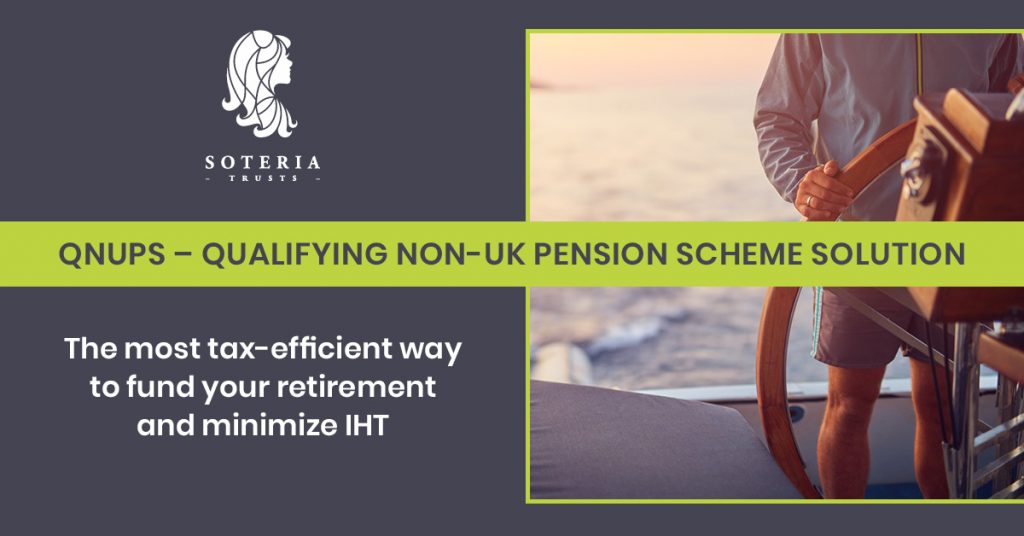What is QNUPS?

Please be advised that the information in this article regarding QNUPS and IHT is no longer accurate due to the recent changes announced in the UK Budget. Starting in April 2025, the regulations will have significant implications that may affect your understanding of these topics. We encourage you to stay informed and consult with a Soteria Trusts expert to navigate these changes effectively.
The QNUPS legislation, also called “The Inheritance Tax (Qualifying Non-UK Pension Schemes) Regulations 2010”, is a set of rules that must be met and followed by Non-UK pensions schemes to put each members pension fund beyond the reach of UK inheritance tax (IHT). The schemes often operate from highly regulated and tax-efficient overseas jurisdictions where each scheme administrator allows members the ability to bring a range of asset classes into the pension and, in doing so, shelter them from IHT in a legitimate way. Popular QNUPS destinations are mainly jurisdictions with which the UK has double taxation agreements in place, such as Guernsey or Hong Kong.
Features of QNUPS
QNUPS is a pension established outside of the UK, and if it meets specific criteria laid down by HMRC, it qualifies for multiple tax reliefs. Although a QNUPS is a pension, the look and feel of them differ from traditional UK domestic pensions. For example, a QNUPS can invest in a wide range of asset classes, much broader than a typical UK pension allows. A member can either contribute cash or existing assets that he has acquired over time. Moreover, the QNUPS legislation grants some additional tax advantages from a standard personal pension.
- No Capital Gains Tax (CGT) will apply to the investment growth.
- IHT efficient from Day 1: No 7-year wait if contributing existing assets.
- No UK IHT upon death. This feature makes QNUPS an excellent Estate Planning tool for many families.
- No contribution limits – No Lifetime Allowance (LTA) tax charges.
- Flexible investment choices such as cash, physical property, funds, ETFs, stock, Alternative Investments and Collections such as jewellery art, cars, furniture etc.
- The retirement age is from 55 – 75 years.
- No maximum age to make contributions, unlike other pension schemes.
- Benefits from Double Taxation Agreements. Certain jurisdictions offer tax-free pension distributions at retirement, making the QNUPS even more attractive to members.

Who can open a QNUPS?
UK Nationals who are either resident or non-resident in the UK, non-UK Nationals who are either resident or non-resident in the UK. Domicile is a significant consideration for all, irrespective of Nationality. For UK Domiciled, the IHT net captures their worldwide assets, whereas non-Domicile will only be liable to the tax on their UK assets.
Who would most benefit from a QNUPS?
Opening a QNUPS can be of benefit to anyone with UK-sited assets. Whether you collect art, jewellery, wines, or cars, if you want to sit in cash or if your preferred investment tipple is stocks, funds, or ETFs, the QNUP can accommodate. Of greater significance is its ability to hold residential investment property. Additionally, if you own assets in other jurisdictions subject to taxes, placing them within the QNUPS can also reduce or mitigate those taxes.
You want to save more than your domestic UK pension allows
QNUPS are an attractive additional retirement savings plan for individuals who have reached the permitted tax-free limit of their domestic UK pension contributions, which right now is £40,000 per year. Therefore, UK resident individuals who have already used their annual and lifetime allowances, but who wish to make further provisions for their retirement, might choose QNUPS.
International Tax-efficient retirement savings
A QNUPS may also be useful for an internationally mobile individual looking for a tax-efficient retirement plan in a politically stable and safe jurisdiction. QNUPS are very tax-efficient as they offer tax freedom on retirement income and investment growth to all. These are often used as a second or even third source of retirement savings, where the domestic pension limits may have been reached.
Inheritance Tax exemption
Given their exemption from the UK Inheritance Tax (IHT), a QNUPS will be of particular interest to UK-domiciled individuals. QNUPS is the fastest-known solution to protect one’s estate, including property, from inheritance tax. As long as the pension is established legitimately and set up to provide you with an income in retirement, then your family or other beneficiaries can inherit the assets without having to pay hefty inheritance taxes following your death.
How will the QNUPS be taxed and how do I receive the pension benefits?
Depending on your country of residence and the rules of your particular QNUPS, you can take a pension commencement lump sum (PCLS) of up to 30% of the value of the pension fund when you reach retirement age. The retirement age differs depending on the jurisdiction; for example, you can access your pension from the age of 55 if the QNUPS is set in Guernsey, but you have to wait until 60 years old to draw from it if it’s set up in Hong Kong. Taxation of the retirement benefits of your QNUPS will again depend on the jurisdiction where the QNUPS is held and your country of residence when pension benefits are received.
The rest of the pension fund is then usually applied to provide a lifetime income through a drawdown formula that HMRC stipulates. In the event of your death, the remaining pension fund will be transferred tax-free to your named beneficiaries.
QNUPS – Qualifying Non-UK Pension Scheme Solution: The secret to escaping inheritance tax?
QNUPS can be a perfect tool for British expats looking to reduce tax liabilities on their estate.
British Nationals, even if they live abroad, are most likely still UK-domiciled, and therefore, are taxed on their worldwide assets for the IHT purposes at a rate of 40% after allowances.
Therefore, an expat living in Hong Kong or France who purchases a holiday home or other residential property there will have it included in their estate on death, and their beneficiaries would need to pay IHT tax on the international assets as well as those they own in the UK.
While expats who have no intentions to return to the UK and no remaining assets there can apply for a non-domiciled status for IHT purposes, most expats retain ties to the UK and could, therefore, be liable. Rather than risk it or leave it to chance, a QNUPS will offer a legitimate solution to help offset IHT (and other) UK taxes.
In any event, UK expats and UK residents who have assets valued in excess of the Nil Rates Bands of £325,000 (singles) and £650,000 for married couples should consider using a QNUPS to shelter their wealth from the death duties, as doing nothing will prove very, very expensive.